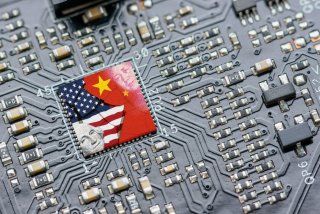Ensuring America Wins Tech Race Against China
It is imperative for lawmakers to focus on enacting policies that promote innovation and ensure our brightest minds in the public and private sectors have the runway they need to pioneer the cutting-edge breakthroughs of tomorrow.
The United States is in danger of losing the tech race to China.
Two weeks ago, the Australian Strategic Policy Institute (ASPI) issued a startling report revealing that China is leading the United States in researching and developing thirty-seven of forty-four critical or emerging technologies across key sectors, such as defense, space, artificial intelligence (AI), energy, environment, biotechnology, advanced materials, robotics, and quantum computing. The findings, which are the result of a year-long initiative in which ASPI examined 2.2 million data points, offer one of the clearest illustrations to date of China’s efforts to position itself as the global leader in science and technology.
This comes amid a collection of recent studies published over the past few years documenting China’s advances in technological innovation and research and development.
In December 2021, Harvard University’s Belfast Center warned that China is outpacing the U.S. in high-tech manufacturing and 5G and could soon overtake us in quantum computing. A study from The National Security Commission on Artificial Intelligence revealed that China is poised to overtake the United States as the world leader in AI by 2030. And earlier this year, the Information Technology and Innovation Foundation (ITIF) issued an alarming report finding that China has now surpassed the United States in total innovation output and has already established itself as the world leader in the implementation of key, cutting-edge technologies.
The literature—coupled with increasingly frequent testimony from industry leaders, high-ranking officials, and military brass—paint a clear and concerning picture: China is beating the United States in the race to develop the transformative technologies of the future. These next-generation technologies—such as AI, quantum computing, and biotechnology—will fundamentally upend practically every facet of society. And whichever country develops them first will enjoy decades of unparalleled economic and geopolitical advantage.
If China succeeds in winning the tech race, it will capture trillions of dollars in economic value, make the world increasingly dependent on its technology and supply chains, and secure a critical military edge that would undermine the national security of the United States and our allies.
Thankfully, this outcome is far from a foregone conclusion. We still have time to channel the entrepreneurial spirit and penchant for innovation that has helped build the United States into the wealthiest, most powerful nation in the history of the globe. But doing so will require a concerted effort, and the same measure of collective focus and strategic thinking we have mustered in response to other grave threats throughout our nation’s past.
The establishment of the U.S. House of Representatives’ new Select Committee on the Strategic Competition between the United States and the Chinese Communist Party is certainly a step in the right direction. Both Chairman Mike Gallagher (WI-8) and Ranking Member Raja Krishnamoorthi (IL-08) are serious legislators with a clear-eyed understanding of the challenges before us.
America’s elected leaders have a responsibility to lead the charge. That is why it has been disconcerting to see some in Congress pushing proposals that would handcuff innovators with onerous new regulations that dictate how our tech companies can compete, who they can compete with, and how their products should function.
This is the wrong approach.
America’s private sector technology companies play an indispensable role in driving innovation. In fact, each year, the six largest U.S. tech companies invest more in research and development than the entire Pentagon. That is why it is imperative for lawmakers to focus on enacting policies that promote innovation and ensure our brightest minds in the public and private sectors have the runway they need to pioneer the cutting-edge breakthroughs of tomorrow.
The recent reports from the Australian Strategic Policy Institute and other esteemed institutions must serve as a wake-up call. For more than eighty years, the United States has stood alone as the global leader in technological development and innovation. But now that primacy is under assault by a determined adversary with the resources and resolve to overtake us. Lawmakers and leaders from across the aisle must respond in kind and ensure we do not allow our technological edge to slip away.
Former U.S. Senators Saxby Chambliss (R-Ga.) and Kent Conrad (D-N.D.) are co-chairs of the American Edge Project’s Economic Advisory Board.
Image: Shutterstock.

